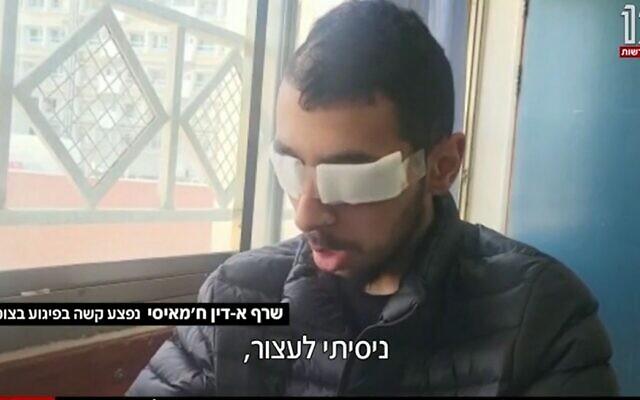
Victim seriously wounded in Megiddo terror bombing has yet to receive state support
The family of an Israeli man who was seriously wounded in an alleged terror bombing at Megiddo Junction in northern Israel earlier this month said they have yet to receive official word from state authorities on support for his recovery.
Victims of terrorist acts receive funding from the government to cover social and medical costs, as well as stipends and disability pensions where relevant.
Speaking to Channel 12 on Tuesday, the father of Shareef ad-Din Hamaishe, 21, said he received one call after the incident that told him to prepare for a phone conversation with President Isaac Herzog, but that call never materialized. The family is currently covering hospital and treatment costs for Hamaishe, who is still hospitalized in the neurosurgery department at Rambam Medical Center in Haifa, some two weeks after the bombing.
The report did not explain why Hamaishe’s treatments are not covered by health insurance, which is universal in Israel.
Hamaishe, from the Arab village of Salem, sustained serious head injuries in the March 13 attack, in which a bomb planted on the side of the Route 65 highway near Megiddo Junction exploded as he drove by with his vehicle. His car, which was hit by the shrapnel, was around 30 meters (98 feet) away from the device.
The Israeli military suspects the attack was carried out by a Hezbollah terrorist who crossed the Lebanon border fence using a ladder.
Hamaishe recounted the bombing to Channel 12 from his hospital room, and with his eyes covered in bandages, telling the network he remembered feeling pressure on the gas pedal and then an explosion. He said he tried to stop the vehicle but could no longer see. Hamaishe said he then “took off the seatbelt and tried to open the door but felt resistance,” after which he put the vehicle in neutral and used the handbrake to stop the car slowly.
His family hopes Hamaishe will return to his university studies in an engineering program in the near future.
The suspected terrorist in the bombing was shot dead by Israeli forces near the border with Lebanon several hours after the explosion. He was armed with a primed explosives belt at the time.
The IDF said it expects that the ongoing construction work to build a wall along the northern frontier to replace an aging fence will be completed within two years.
The IDF has said the suspect planted the bomb, possibly on behalf of the Iran-backed Hezbollah, which maintains tight control of southern Lebanon. The possibility of the attack being a joint effort between a Palestinian faction in Lebanon and Hezbollah was also being evaluated by the IDF.
The bomb itself was considered unusual according to the IDF, and did not appear to be similar to explosive devices used by Palestinians in recent months.
Hezbollah has long been the IDF’s most significant adversary on Israel’s borders, with an estimated arsenal of nearly 150,000 rockets and missiles that can reach anywhere in Israel.
Source » timesofisrael





